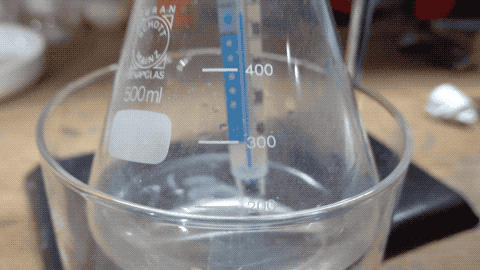metalresearcher
National Hazard
   
Posts: 757
Registered: 7-9-2010
Member Is Offline
Mood: Reactive
|
|
Supercooled water in evacuated flask
Not really chemistry, but a weird phenomenon.
I let water freeze in an erlenmeye flask using a vacuum pump, starting at 13 C and within a few minutes is was -4 C and still liquid ! Even tapping or
shaking the flask did not let it freeze.
Running one or two minutes longer resulted in a very quick freeze and the temperature rose to 0 C.
Earlier tests did the same.
Why does water not freeze when it reaches 0 C ? It is just tap drinking water (i.e. not demineralized or distilled).

|
|
|
Vomaturge
Hazard to Others
  
Posts: 286
Registered: 21-1-2018
Member Is Offline
Mood: thermodynamic
|
|
I would guess it has to do with the smooth glass container plus you're rapidly cooling the water from the inside out by heat of evaporation. Put a
clean erlenmeyer full of tap water in the microwave and you might be able to get it to flash boil the same way.
The near 100% H2O atmosphere might have something to do with it not crystallizing when you shake it? I'm reaching there but maybe that's a
contributing factor.
I now have a YouTube channel. So far just electronics and basic High Voltage experimentation, but I'll hopefully have some chemistry videos soon. |
|
|
Fyndium
International Hazard
    
Posts: 1192
Registered: 12-7-2020
Location: Not in USA
Member Is Offline
|
|
I've had supercool water and flash boiling water many times, to my pain. Once I almost got a liter beaker of water shoot onto me when I opened the
microwave and was about to take the flask out and once I thought why it isn't still boiling, it took off.
Liquids don't have to be pure, and it appears not even without physical contamination to supersaturate or supercool. There are many compounds that are
notoriously resistant to crystallization, even when the melting point is something like 40C. The impurity particles seem to be into some sort of
equilibrium with the liquid to not cause seed crystallization, meaning that they have no whatever negativity or positivity towards the liquid. Adding
new particles will usually cause this because they haven't "set in" yet.
I remember cooling acetone to very cold, below my thermometer reading with vacuum once I was starting chemistry and tested all kind of stuff.
|
|
|